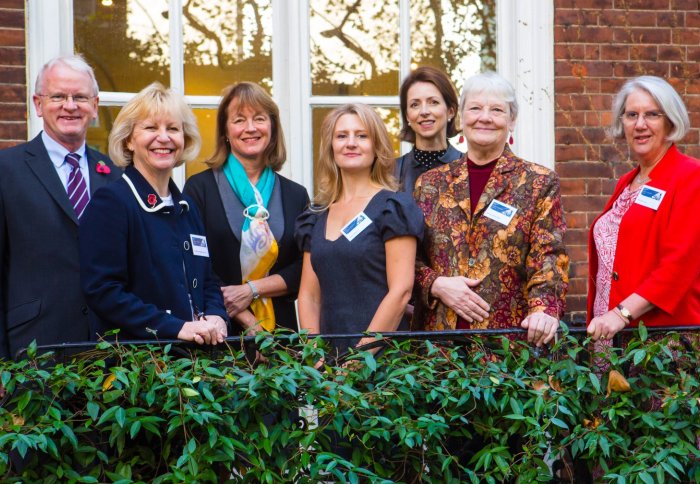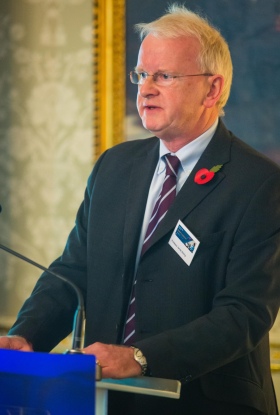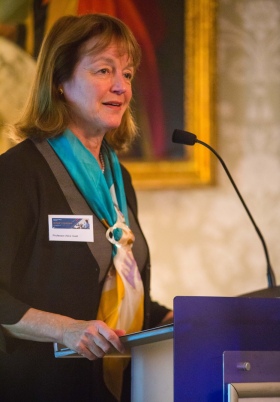Imperial champions women's leadership

Imperial celebrated the successes of women in science and business at an event held on Tuesday 4 November.
Titled Women’s Leadership in Entrepreneurial and STEMM cultures, the event brought together high achieving women from across the higher education, business and the public sectors to share their personal career journeys.
Aiming to provide a forum for debate and discussion about how to encourage and promote female leadership, the event was organised by Karen Makuch, Ambassador for Women in the Faculty of Natural Sciences and hosted by Professor Maggie Dallman – Faculty Dean and Associate Provost (Academic Partnerships) Designate.
 Imperial’s Provost Professor James Stirling opened the event, highlighting some of the initiatives that the College is championing to promote women in Science: “At Imperial we are committed to the Athena SWAN programme - with all Departments at the College either holding awards or with applications in progress. New initiatives to promote, support and celebrate women in science are springing up all the time. These collectively impact on the culture of our institution, and make the College a place which appreciates and nurtures the talents of the world’s best scientists, regardless of gender.”
Imperial’s Provost Professor James Stirling opened the event, highlighting some of the initiatives that the College is championing to promote women in Science: “At Imperial we are committed to the Athena SWAN programme - with all Departments at the College either holding awards or with applications in progress. New initiatives to promote, support and celebrate women in science are springing up all the time. These collectively impact on the culture of our institution, and make the College a place which appreciates and nurtures the talents of the world’s best scientists, regardless of gender.”
Baroness Jolly, Life Peer in the House of Lords and Government Whip, discussed the importance of levelling the playing field for the UK economy.
She said: “I graduated in engineering and in the 1970’s I found it a challenge to find a job in such a male dominated sector. At an interview I was once told that I should look for work with a company designing washing machines, a field of engineering which was considered far more suitable for women! Attitudes like this only change through effective leadership.
Solutions to the complex problems facing the world today depend upon collaborative research and the creative application of that research. We need more women in STEMM fields because we need the world’s best minds working together.
– Professor Alice Gast
President
“We know that there are still too many barriers preventing women from reaching their full potential in the workplace, and these challenges are shared across sectors. We must continually ask ourselves whether we are casting the net wide enough, and whether we are tapping into the ocean of talented women – because we know that they are there.”
Norma Jarboe OBE, founder and Director of Women Count - a non-profit organisation benchmarking women’s leadership across charitable, academic and public bodies – also spoke at the event. She presented the findings of WomenCount: Leaders in Higher Education 2013 - her recent report on the number of women in senior leadership positions in higher education.
The report found that a fifth of university boards are now considered gender balanced, but women make up only 17% of UK Vice Chancellors and just 12% of university chairs.
Norma Jarboe said: “The spotlight has often been on the number of women on boards in the private sector, but Higher Education is just as important. The university sector is the lynchpin of the 21st Century knowledge economy. We can’t afford to have gendered leadership or gendered knowledge and research.”
Driving Change
Helena Morrissey CBE, CEO of Newton Investment Management, founded the 30% Club in 2010. A cross business initiative, it aims to achieve 30% of women on UK corporate boards by 2015 by voluntary business-led change. With the figure now standing at 22.8%, Helena discussed the work that the 30% Club have done to effect change.
She said: “A few years into my role as CEO of Newton I realised that many young women were coming up to me for advice, especially if they were thinking about having a child. I realised that I had a responsibility to help.
“There has been an epiphany in British business over the past four years. To begin with the 30% Club was met with a lot of resistance, but it is now accepted that in order to have a modern business the board needs to be diverse.”
 Imperial’s President Professor Alice Gast brought the presentations to a close by sharing her thoughts on what could be done to increase women in STEMM. This included boosting collaboration, increasing the number of female role models, providing inspiring mentors, recognising the success and achievements of women scientists and ensuring access to funding.
Imperial’s President Professor Alice Gast brought the presentations to a close by sharing her thoughts on what could be done to increase women in STEMM. This included boosting collaboration, increasing the number of female role models, providing inspiring mentors, recognising the success and achievements of women scientists and ensuring access to funding.
Speaking at the event, Professor Gast said: “I know first-hand the challenges and joys that come from falling in love with science at a young age. When I was a student, women in STEMM were few in number. Today things have improved significantly, but women still remain underrepresented in this area. There is a need for more progress, and a renewed sense of urgency to accelerate the pace of change.”
“Solutions to the complex problems facing the world today depend upon collaborative research and the creative application of that research. We need more women in STEM fields because we need the world’s best minds working together.”
“We are on the right path - the momentum is there, the need is there, and the time is right. There is much to do and there are many ways to contribute.”
Article text (excluding photos or graphics) © Imperial College London.
Photos and graphics subject to third party copyright used with permission or © Imperial College London.
Reporter
Deborah Evanson
Communications Division